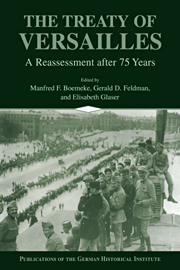Book contents
- Frontmatter
- Introduction
- Prologue: 1919-1945-1989
- PART ONE PEACE PLANNING AND THE ACTUALITIES OF THE ARMISTICE
- PART TWO THE PEACEMAKERS AND THEIR HOME FRONTS
- 6 Great Britain: The Home Front
- 7 The French Peacemakers and Their Home Front
- 8 The American Mission to Negotiate Peace: An Historian Looks Back
- 9 Between Compiègne and Versailles: The Germans on the Way from a Misunderstood Defeat to an Unwanted Peace
- 10 A Comment
- PART THREE THE RECONSTRUCTION OF EUROPE AND THE SETTLEMENT OF ACCOUNTS
- PART FOUR THE LEGACY AND CONSEQUENCES OF VERSAILLES
- PART FIVE ANTECEDENTS AND AFTERMATHS REFLECTIONS ON THE WAR-GUILT QUESTION AND THE SETTLEMENT
- Bibliography
- Index
10 - A Comment
from PART TWO - THE PEACEMAKERS AND THEIR HOME FRONTS
Published online by Cambridge University Press: 05 January 2013
- Frontmatter
- Introduction
- Prologue: 1919-1945-1989
- PART ONE PEACE PLANNING AND THE ACTUALITIES OF THE ARMISTICE
- PART TWO THE PEACEMAKERS AND THEIR HOME FRONTS
- 6 Great Britain: The Home Front
- 7 The French Peacemakers and Their Home Front
- 8 The American Mission to Negotiate Peace: An Historian Looks Back
- 9 Between Compiègne and Versailles: The Germans on the Way from a Misunderstood Defeat to an Unwanted Peace
- 10 A Comment
- PART THREE THE RECONSTRUCTION OF EUROPE AND THE SETTLEMENT OF ACCOUNTS
- PART FOUR THE LEGACY AND CONSEQUENCES OF VERSAILLES
- PART FIVE ANTECEDENTS AND AFTERMATHS REFLECTIONS ON THE WAR-GUILT QUESTION AND THE SETTLEMENT
- Bibliography
- Index
Summary
Public opinion is an elusive entity. How, precisely, does one measure its impact on foreign policy? Often, the most one can say is that it exists and that politicians have to respond to it, even if only in the form of lip service. In 1918 politicians were especially sensitive to public opinion after four years of total war, a war of peoples, whose outcome was acclaimed in the three great Western victor-states as the triumph of democracy over autocracy. In all the former warring states, including for the first time Germany, political leaders were directly answerable to public opinion in the form of mass electorates, parties, or coalitions in representative assemblies and had to pay heed to the ever present agitations of the popular press. The Italian delegation, after all, actually walked out of the Paris peace conference for some weeks, in response to perceptions of public outrage on the issue of Fiume. Popular expectations across Europe were stimulated to dangerous heights. Hopes were aroused that the war, with its unprecedented strains, disruptions, and heartaches, would lead to something better. Hence the millenarian appeal, among the victors and defeated alike, of Wilsonian liberalism. Hence, too, the elemental desire that the losers be made to pay, in the widest sense, for the events of the last four years and be rendered harmless to repeat them. Such was felt to be the unique importance of peacemaking that, in the Allied states, the three supreme elected representatives of the people decided independently not merely to attend the conference, but to lead their delegations and to fulfill in person the national will, while their foreign ministers danced attendance, in each case little more than a cipher.
- Type
- Chapter
- Information
- The Treaty of VersaillesA Reassessment after 75 Years, pp. 221 - 246Publisher: Cambridge University PressPrint publication year: 1998
- 1
- Cited by



